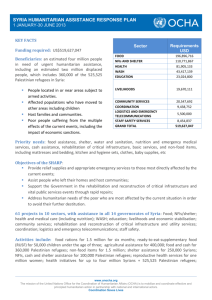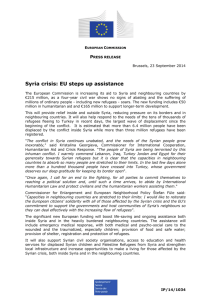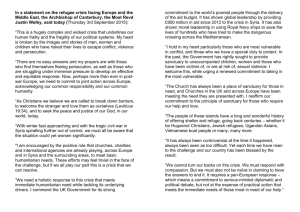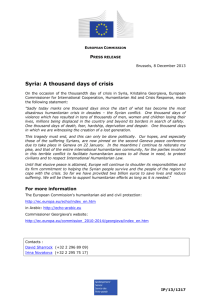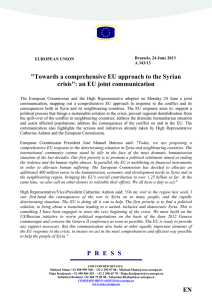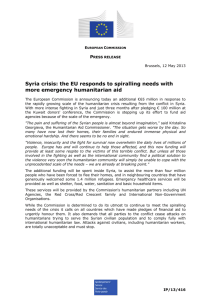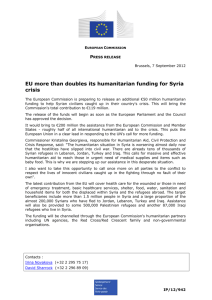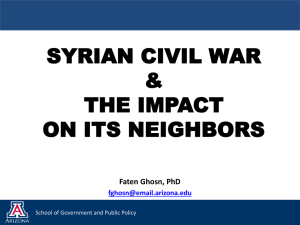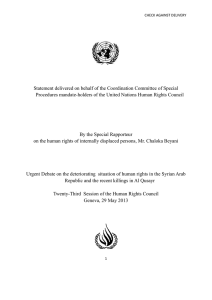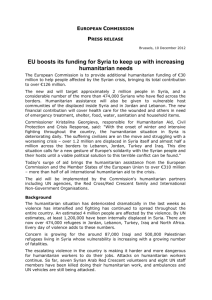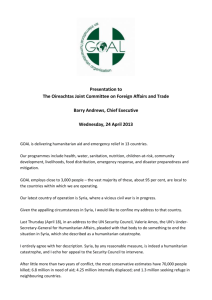DOC - Europa
advertisement
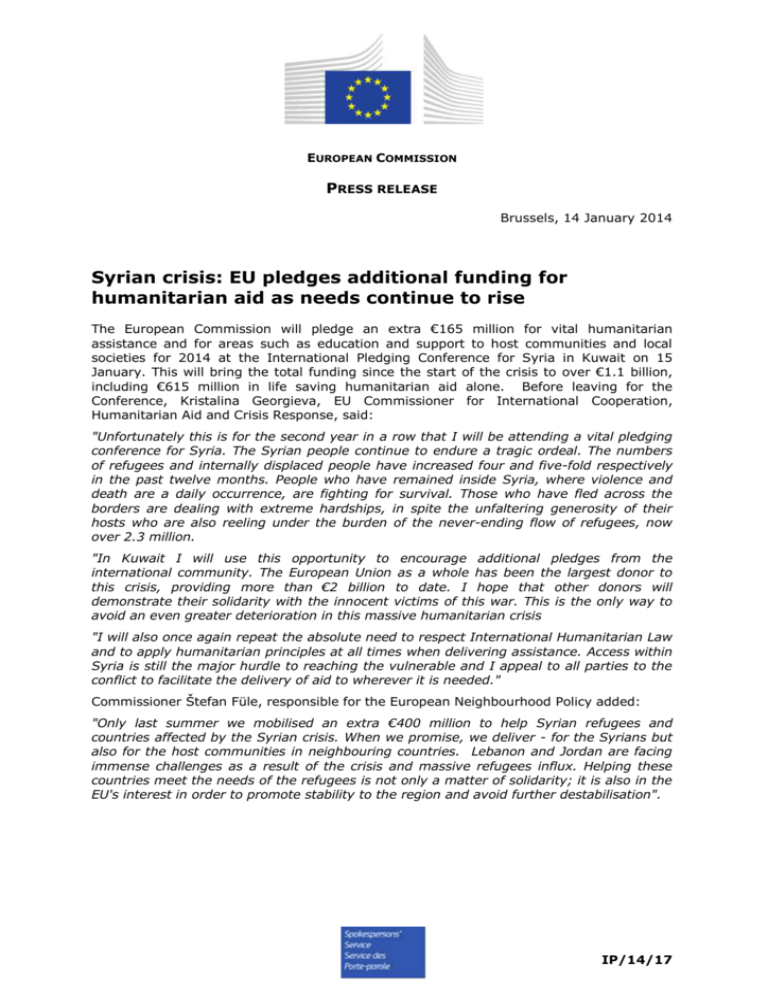
EUROPEAN COMMISSION PRESS RELEASE Brussels, 14 January 2014 Syrian crisis: EU pledges additional funding for humanitarian aid as needs continue to rise The European Commission will pledge an extra €165 million for vital humanitarian assistance and for areas such as education and support to host communities and local societies for 2014 at the International Pledging Conference for Syria in Kuwait on 15 January. This will bring the total funding since the start of the crisis to over €1.1 billion, including €615 million in life saving humanitarian aid alone. Before leaving for the Conference, Kristalina Georgieva, EU Commissioner for International Cooperation, Humanitarian Aid and Crisis Response, said: "Unfortunately this is for the second year in a row that I will be attending a vital pledging conference for Syria. The Syrian people continue to endure a tragic ordeal. The numbers of refugees and internally displaced people have increased four and five-fold respectively in the past twelve months. People who have remained inside Syria, where violence and death are a daily occurrence, are fighting for survival. Those who have fled across the borders are dealing with extreme hardships, in spite the unfaltering generosity of their hosts who are also reeling under the burden of the never-ending flow of refugees, now over 2.3 million. "In Kuwait I will use this opportunity to encourage additional pledges from the international community. The European Union as a whole has been the largest donor to this crisis, providing more than €2 billion to date. I hope that other donors will demonstrate their solidarity with the innocent victims of this war. This is the only way to avoid an even greater deterioration in this massive humanitarian crisis "I will also once again repeat the absolute need to respect International Humanitarian Law and to apply humanitarian principles at all times when delivering assistance. Access within Syria is still the major hurdle to reaching the vulnerable and I appeal to all parties to the conflict to facilitate the delivery of aid to wherever it is needed." Commissioner Štefan Füle, responsible for the European Neighbourhood Policy added: "Only last summer we mobilised an extra €400 million to help Syrian refugees and countries affected by the Syrian crisis. When we promise, we deliver - for the Syrians but also for the host communities in neighbouring countries. Lebanon and Jordan are facing immense challenges as a result of the crisis and massive refugees influx. Helping these countries meet the needs of the refugees is not only a matter of solidarity; it is also in the EU's interest in order to promote stability to the region and avoid further destabilisation". IP/14/17 The additional funding will boost life-saving and ongoing assistance both inside Syria and in the heavily burdened neighbouring countries. The assistance will include emergency medical response, with both medical and psycho-social care to the wounded and the traumatized, especially children; provision of food and safe water; provision of shelter, registration and thus protection of refugees. Aid will continue to be provided to the displaced and refugees - who often arrive destitute – as well as to their host communities, whose resources are now stretched to breaking point. The assistance will be channelled through the European Commission's humanitarian partners: UN agencies, the Red Cross/Red Crescent family and international nongovernmental organisations. Background The consequence of the conflict is a grave humanitarian situation in both Syria and neighbouring countries. Over the past year an increasing number of people have been displaced both internally and across borders. According to UNOCHA, the number of people in need inside Syria is 9.3 million, an increase of 230% in just one year. There are now an estimated 6.5 million displaced Syrians inside the country, an increase of 540%. Refugee numbers have also increased by 460% and there is now an estimated 2.35 million in Lebanon, Jordan, Turkey, Iraq, Egypt and North Africa. The deteriorating situation and the ever-increasing needs led the United Nations to issue a new appeal on 16 December 2013 - the largest in UN history. The revised Syrian Government Response Plan and Syrian Regional Response Plan calls for US$6.5 billion in total in order to provide humanitarian aid to Syria and neighbouring countries. The second high-level International Pledging Conference for Syria will take place in Kuwait City on 15 January 2014. The Conference aims to rally further international financial support to provide basic humanitarian aid to the millions of Syrians in need. It will be chaired by the UN Secretary-General, Ban Ki-moon and hosted by the Emir of Kuwait, His Highness Sheikh Sabah Al-Ahmed Al-Jaber Al-Sabah. EU Funding The European Union (Commission and Member States) is the largest donor in this crisis. With the pledges delivered after the first donors' conference in Kuwait on 30 January 2013 and the adoption on 6 June of a major new package of EU assistance in response to the Syria crisis for the total amount of €400 million, including € 250 million in humanitarian aid, the total committed EU humanitarian assistance now stands over €1.6 billion - more than €1.09 billion from Member States, and over €515 million from the Commission's humanitarian aid budget. In-kind assistance has also been provided to Turkey and Jordan through the activation of the European Civil Protection Mechanism, which led to the delivery of ambulances, blankets, heaters and other items for a total value €2.5 million. €491 million have also been mobilised through other non-humanitarian EU instruments (i.e. for education, support to host communities and local societies) – bringing the total to more than €2 billion from 2011-2013. 2 Contacts : David Sharrock (+32 2 296 89 09) Irina Novakova (+32 2 295 75 17) Peter Stano (+32 2 295 74 84) Anca Paduraru (+32 2 296 64 30) For the public: Europe Direct by phone 00 800 6 7 8 9 10 11 or by e-mail 3
